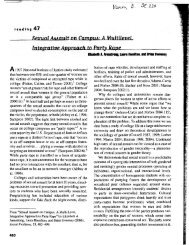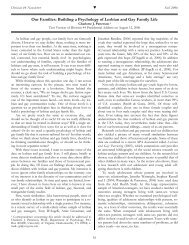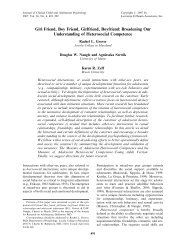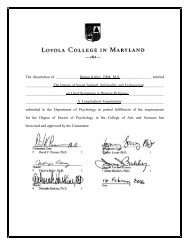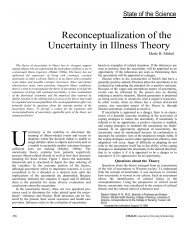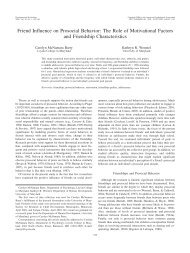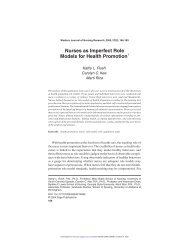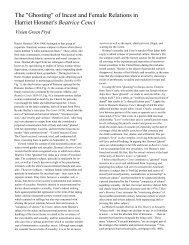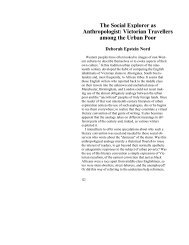17 The Close Relationships of Lesbians, Gay Men, and Bisexuals
17 The Close Relationships of Lesbians, Gay Men, and Bisexuals
17 The Close Relationships of Lesbians, Gay Men, and Bisexuals
Create successful ePaper yourself
Turn your PDF publications into a flip-book with our unique Google optimized e-Paper software.
Conflict <strong>and</strong> Violence<br />
461<br />
Problems <strong>and</strong> disagreements are inevitable in close relationships. Re-<br />
search indicates that lesbian, gay male, <strong>and</strong> heterosexual couples are similar<br />
in how <strong>of</strong>ten <strong>and</strong> how intensely they report arguing (Metz, Rosser, <strong>and</strong><br />
Strapko 1994). Comparative studies <strong>of</strong> homosexual <strong>and</strong> heterosexual rela-<br />
tionships suggest that similar types <strong>of</strong> conflict are likely to arise. In a study<br />
<strong>of</strong> 234 gay male, lesbian, <strong>and</strong> heterosexual couples, Kurdek (1994a) found<br />
that all three types <strong>of</strong> couples had very similar ratings <strong>of</strong> which topics they<br />
most frequently fought about, with intimacy <strong>and</strong> power issues ranked at the<br />
top <strong>and</strong> distrust ranked at the bottom. Some differences have been found<br />
between same-sex <strong>and</strong> heterosexual couples. For example, gay <strong>and</strong> lesbian<br />
couples report fighting less about money management than do heterosexual<br />
couples, perhaps because same-sex couples are less likely to merge their<br />
funds <strong>and</strong> more likely to have two incomes (Blumstein <strong>and</strong> Schwartz 1983).<br />
Some have suggested that same-sex couples might experience unique<br />
problems based on their shared gender role socialization (for a review, see<br />
Patterson <strong>and</strong> Schwartz 1994). For lesbians, intimacy issues might be par-<br />
ticularly important because women are socialized to place a strong value on<br />
closeness <strong>and</strong> intimacy. As one example, clinicians have described partners<br />
who become so close that personal boundaries are blurred <strong>and</strong> a healthy<br />
sense <strong>of</strong> individuality is threatened (Burch 1986; Falco 1991). This emphasis<br />
on closeness might be reflected in survey data showing that lesbians are more<br />
likely than gay men to report conflicts about work cutting into relationship<br />
time (Blumstein <strong>and</strong> Schwartz 1983).<br />
For gay men, gender role socialization can foster competition with inti-<br />
mate partners (Hawkins 1992; Shannon <strong>and</strong> Woods 1991; but see also<br />
McWhirter <strong>and</strong> Mattison 1984). For example, although partners in hetero-<br />
sexual, lesbian, <strong>and</strong> gay male couples all feel successful when they earn high<br />
incomes, only gay men feel even more successful when they earn more than<br />
their partners do (Blumstein <strong>and</strong> Schwartz 1983). <strong>Gay</strong> men are more likely<br />
than lesbians to report relationship conflicts over income differences or part-<br />
ners' unemployment (Blumstein <strong>and</strong> Schwartz 1983; Harry 1984).<br />
How well do lesbians <strong>and</strong> gay men solve problems that arise in their<br />
relationships? In a recent study <strong>of</strong> 353 homosexual <strong>and</strong> heterosexual couples,<br />
Kurdek (1998b) found no differences in the likelihood <strong>of</strong> using positive<br />
problem-solving styles such as focusing on the problem <strong>and</strong> negotiating or<br />
compromising. Nor were differences found in the use <strong>of</strong> poor strategies such



